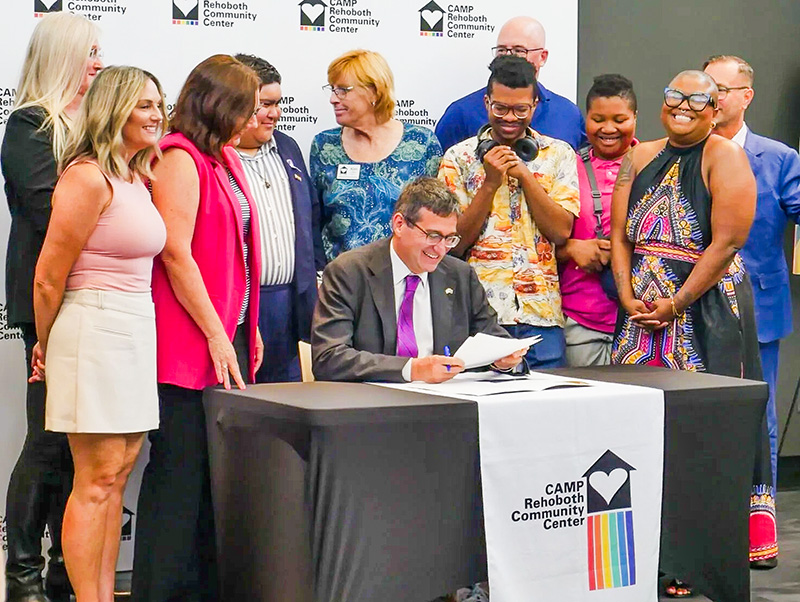Montana Court Strikes Down Trans Youth Care Ban
A Montana judge has declared the state's ban on gender-affirming care for transgender youth unconstitutional.

A Montana court has struck down that state’s law banning gender-affirming care for transgender minors, finding that restricting their access to care — and punishing the doctors who attempt to provide that care — is unconstitutional.
Montana Fourth Judicial District Judge Jason Marks found that the 2023 law, pushed through by Montana Republicans, violates transgender minors’ right to privacy, equal protection, and free speech, as guaranteed by the Montana Constitution.
A lower court had previously issued an order blocking the law from taking effect in 2023, which the Montana Supreme Court upheld last December.
Republican lawmakers argued that passing the bill was needed to protect minors from starting hormonal treatments that are experimental and initiating the process of transitioning, which they might later come to regret.
Marks, however, noted in his ruling that Montana does not ban other medical treatments “based on potential risks or inadequate evidence of efficacy.”
He said the state was “unable to clearly and convincingly establish that a bona fide health risk exists,” pointing to the positions of many medical and mental health organizations that endorse hormone therapy as a treatment for gender dysphoria.
Moreover, he noted, the plaintiffs challenging the law provided evidence that cisgender minors have access to many of the same treatments, such as puberty blockers or hormone therapy, that are barred for transgender-identifying minors.
Marks found that transgender minors’ ability to access care is protected by a law passed with the intention of allowing people to pursue alternative treatments for COVID-19 during the 2023 session. It allows adults and minors to receive medications that the Food and Drug Administration has not yet approved.
“The Court is forced to conclude that the State’s interest is actually a political and ideological one: ensuring minors in Montana are never provided treatment to address their ‘perception that [their] gender or sex’ is something other than their sex assigned at birth,” Marks wrote. “In other words, the State’s interest is actually blocking transgender expression.”
Marks rejected the argument that the existence of so-called “detransitioners” proves that gender-affirming care poses an inherent risk to patients’ health, noting that rates of remorse or regret among those that seek out medical interventions is rare.
“[I]t is illogical for the Montana Legislature to pass laws regulating medical treatment that would hurt a majority where it might help the minority,” Marks wrote. “As the United States Supreme Court has recognized, ‘the government does not have a legitimate interest in protecting against the ‘fear that people [will] make bad decisions if given truthful information.'”
He continued, “Regardless, the fact that a minority of individuals express regret following gender-affirming medical care does not establish a medically acknowledged, bona fide health risk. Otherwise, most every medical treatment would…be subject to State interference.”
The case was brought by Lambda Legal, the American Civil Liberties Union, and the ACLU of Montana on behalf of two transgender minors and their parents, and two physicians that treat youth suffering from gender dysphoria.
The plaintiffs argued that the ban on gender-affirming treatments not only violated their right to medical privacy, but was discriminatory.
With Marks finding that the law is unconstitutional, transgender youth in Montana will still be able to access gender-affirming treatments as long as their personal physicians agree to treat transgender minors. Many practitioners have stopped seeing transgender patients due to external threats or violence or fears of prosecution.
Because the privacy clause is unique to Montana’s constitution, the ruling will also likely insulate those minors from any action taken by the U.S. Supreme Court. The conservative-leaning high court recently heard arguments in a case challenging a similar Tennessee ban on gender-affirming care, and may rule that states are within their right to restrict minors from accessing such treatments.
The plaintiffs expressed relief at the ruling.
“I will never understand why my representatives worked so hard to strip me of my rights and the rights of other transgender kids,” Phoebe Cross, a 17-year-old transgender boy, said in a statement. “It’s great that the courts, including the Montana Supreme Court, have seen this law for what it was, discriminatory, and today have thrown it out for good. Just living as a trans teenager is difficult enough. The last thing me and my peers need is to have our rights taken away.”
Support Metro Weekly’s Journalism
These are challenging times for news organizations. And yet it’s crucial we stay active and provide vital resources and information to both our local readers and the world. So won’t you please take a moment and consider supporting Metro Weekly with a membership? For as little as $5 a month, you can help ensure Metro Weekly magazine and MetroWeekly.com remain free, viable resources as we provide the best, most diverse, culturally-resonant LGBTQ coverage in both the D.C. region and around the world. Memberships come with exclusive perks and discounts, your own personal digital delivery of each week’s magazine (and an archive), access to our Member's Lounge when it launches this fall, and exclusive members-only items like Metro Weekly Membership Mugs and Tote Bags! Check out all our membership levels here and please join us today!






























You must be logged in to post a comment.